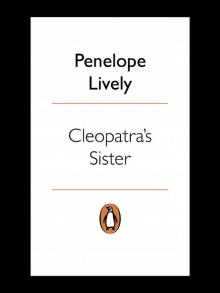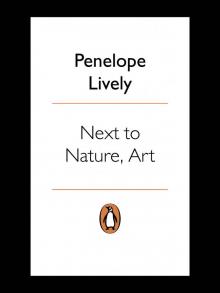- Home
- Penelope Lively
The Purple Swamp Hen and Other Stories
The Purple Swamp Hen and Other Stories Read online
By the same author
FICTION
Going Back
The Road to Lichfield
Nothing Missing But the Samovar and Other Stories
Treasures of Time
Judgement Day
Next to Nature, Art
Perfect Happiness
Corruption and Other Stories
According to Mark
Pack of Cards: Stories 1978–1986
Moon Tiger
Passing On
City of the Mind
Cleopatra’s Sister
Heat Wave
Beyond the Blue Mountains and Other Stories
Spiderweb
The Photograph
Making It Up
Consequences
Family Album
How It All Began
NONFICTION
The Presence of the Past: An Introduction to Landscape History
Oleander Jacaranda: A Childhood Perceived
A House Unlocked
Ammonites and Leaping Fish: A Life in Time
VIKING
An imprint of Penguin Random House LLC
375 Hudson Street
New York, New York 10014
penguin.com
Copyright © 2016 by Penelope Lively
Penguin supports copyright. Copyright fuels creativity, encourages diverse voices, promotes free speech, and creates a vibrant culture. Thank you for buying an authorized edition of this book and for complying with copyright laws by not reproducing, scanning, or distributing any part of it in any form without permission. You are supporting writers and allowing Penguin to continue to publish books for every reader.
First published in Great Britain by Fig Tree, an imprint of Penguin Random House UK
“Abroad” was published in digital format by Penguin Books in 2013.
ISBN 9780735222038 (hardcover)
ISBN 9780735222045 (e-book)
This is a work of fiction. Names, characters, places, and incidents either are the product of the author’s imagination or are used fictitiously, and any resemblance to actual persons, living or dead, businesses, companies, events, or locales is entirely coincidental.
Version_1
Contents
By the Same Author
Title Page
Copyright
The Purple Swamp Hen
Abroad
The Row
Who Do You Think You Were?
Old as the Hills
A Biography
The Weekend
License to Kill
Mrs. Bennet
Lorna and Tom
Point of View
DIY
The Bridge
Theory of Mind
The Third Wife
About the Author
The Purple Swamp Hen
I am the Purple Swamp Hen. Porphyrio porphyrio, if you are into taxonomy and Latin binomials. And, let me get this clear, I am Porphyrio porphyrio porphyrio, the nominate subspecies, not to be confused with the Australasian lot—P. p. melanotus, or the Indonesian crowd—P. p. pulverulentis. And others. No, indeed; we are talking species definition here, the enduring stuff, and thus I endure—founding father, the Mediterranean nominate. I am eternally defined, thanks to Linnaeus, himself stuck in the seventeenth century, and we would have been rather beyond his range—we’ve never bothered with Scandinavia nor indeed with the Americas, they have quite enough species of their own, by all accounts. That said, our range is extensive, and it seems that in conservation terms we are, in a general sense, of Least Concern—in your time, that is. Though I’m glad to say that we—the home team, the Mediterranean Purple Swamp Hen—require strict protection on account of habitat loss, hunting and pesticide use.
Wondering where all this is going? Have patience. You’ll get your story. You know me. You know me on the famous garden fresco from Pompeii—somewhat faded, a travesty of my remarkable plumage, but nevertheless a passable portrait. You all exclaim over those frescoes: the blues and greens, the precise depiction of flora and fauna. Oh, look! you cry—there are roses, and ferns, oleanders, poppies, violets. And oh! there’s a pigeon, a jay, a swallow, a magpie. You don’t cry—oh! a Purple Swamp Hen, because the vast majority of you can’t recognize one. You eye me with vague interest, and pass on. It’s just like a garden today! you cry.
No, it isn’t. Wasn’t. I am—was—in this garden because it was a Roman garden and the Romans kept us there for ornamental purposes. Occasionally they ate us, but more often they didn’t. We decorated the place, alongside the statues and the fountains. That’s one distinction, though the tradition persists, I believe—those creatures called peacocks—but I regard us as unique in terms of horticultural decor. But, make no mistake, the garden of Quintus Pompeius, where I passed my time, was nothing like any garden you’ve ever known.
It hosted fornication, incest, rape, child abuse, grievous bodily harm—and that’s just Quintus Pompeius, his household and his associates. We fauna simply got on with the business of copulation and reproduction; far more imaginative, Homo sapiens. The climate of the Bay of Naples was warm (and going to get a lot warmer, but we’ll come to that), and they liked to be out of doors as much as possible. Eat out, sleep out, wash the dishes, pluck a pigeon, gossip, quarrel, wallop an old slave, fuck that pretty new one, plot, scheme, bribe, threaten. Get drunk, utter obscenities, vomit in the acanthus.
I saw it all. I heard it all.
Let me fill you in on the general situation that autumn, in the household of Quintus Pompeius. Livia, wife of Q. Pompeius, has a new hairstyle. Major event—oh, yes. Fetching curly strands around the forehead. The new hairstyle is appreciated by Quintus, and even more so by Livia’s lover, Marcus Sempronius, business associate of the husband, who does not know of this further family arrangement. Quintus himself is deeply embroiled in politics; he wants to be elected to the city council, to become a magistrate, which means an intensive process of persuasion, bribery, boasting and general manipulation of what passes for democracy in Pompeii. Of his children, his eldest son, Titus, aged eighteen, is theoretically employed in the family winery but spends most of his time hanging out downtown with his friends. His younger sister Sulpicia helps her mother chivy the slaves around. The two youngest children, aged five and six, occupy themselves in the garden—making mud pies, digging for worms, catching grasshoppers, pulling the wings off butterflies. Chasing Purple Swamp Hens.
Quintus and his son Titus both have their way with the new slave girl, Servilia, whenever they feel like it. Nobody would question their right to do so. Servilia is fourteen years old.
Servilia washes dishes. She also sweeps, empties chamber pots, carries water, and is being trained to help Livia with her toilette. She is not as yet very good at this, and gets cuffed a lot.
Other slaves, too, do all these things. The whole place is in a ferment of activity, morning till night, from the fetid stew of the kitchen area to the relative fresh air of the garden. People everywhere—fetching, carrying, getting in each other’s way, shouting, being shouted at. The atrium fills up with those who have come to see Quintus Pompeius—to cut a deal with him, get rooked by him, curry favor with him, sign up to some propitious arrangement. He may take a turn in the garden with one or two of these, which is how I knew that he was cornering the market in Etruscan wine imports, that he was spreading salacious rumors about a fellow candidate, that he owed money in various directions and resisted payment, that he was owed in various other dire
ctions—and was uttering dire threats.
Thus, the daily life of the household. And of scores of other households in the city—prosperous households, the households that called the shots. Elsewhere, much the same took place, on a lesser scale—among those engaged in selling bread and oil and grain and fruit and fish and meat and dormice and sea urchins. Plus the provision of various services, including of course sex. Not so much garden life, there; horticulture the preserve of the well heeled.
All the same to me—master, mistress, slave. Egalitarian—my outlook. Detached, you might say. A forensic interest in the practices of this curious species.
Let us take some instances of attitude and behavior.
They find it perfectly acceptable that one lot possesses another lot. So, half the inhabitants of the city wait upon the other half; a section of them are commodities, to be bought and sold like a loaf of bread or a flagon of wine.
We—we swamp hens, swallows, golden orioles, sparrows and all else—eat in order to survive. No more and no less. They eat to excess, with deplorable consequences. Eating as entertainment it would appear to be. Along with the lavish consumption of wine, which has this humiliating effect on them. Except that they apparently find it enjoyable rather than humiliating.
Quintus Pompeius is a wine magnate. Was, was . . . I keep forgetting. Preserved into your time on that fresco, floating timeless, I have somewhat lost my grip on chronology. Quintus P. is ashes now, or rather, he is a featureless gray cast, stared at by innumerable visitors to the site of his demise.
My demise also? Certainly not. Wait. We’ll get to that.
The Q. Pompeius wine business is both manufacture and distribution. It procures grapes, it processes them, stores the product and then enables inhabitants of the city to get legless as often as they wish or can afford to do so. An ideal trade—the bottom is never going to fall out of wine. The human race is fueled by it, one observes.
This, then, was the setup: the family, the household, the supporting business. All coasting along as normal in the run-up to that climacteric event of which you already know.
Livia took an almighty risk. She entertained her lover, Marcus Sempronius, in a secluded part of the garden while Quintus Pompeius was out of the way, visiting a political supporter. Entertainment in every sense of the word; I heard the moans and groans and passed by with disdain.
Sulpicia, her daughter, was courting the son of a neighbor. They too made full use of the garden. Lucius, a Greek slave who was the principal cook, was engaged in a feud with Sextus, the Libyan thug responsible for janitor duties; these two brawled outside the kitchen, where Servilia scoured pans and occasionally fetched up as collateral damage.
Servilia is of interest. She was a recent acquisition, spotted by Quintus P. and bought off a friend, for whom she was surplus goods. I am no connoisseur of the human female but it would seem that she was appealing. Other males of the household eyed her up, but were wise enough not to encroach. As far as I was concerned, she was just another presence, until a particular morning which made her of interest.
The children had been chasing me. This happened, not infrequently. I kept well away, when they were in the garden, and if they did get near and start molesting, I am quick on my feet and could be off pretty smartly. On this occasion, I was unwary. They crept up, and the boy had me by the neck.
“Pull its feathers off!”
“Kill it!”
“Let me have it!”
They squabbled. I lost a tail feather.
“I saw it first! I want it!”
“Kill it! Let’s kill it!”
She must have heard, Servilia. She came over. She remonstrated. She said that their parents might not wish me killed. The children told her to get lost.
And then she reached out, prized me out of the boy’s hands, and let me go.
I flew up onto the fountain.
We looked at each other, bird and girl.
“Thanks,” I said.
“My pleasure,” said she.
No language passed, but perfect understanding. Something I had not come across before with that species.
The children rushed off to their mother, and reported Servilia for un-slavelike conduct. Livia was not much interested, preoccupied with a fear that Quintus might be on to her activities with his associate. Also, a swamp hen is garden decor, nothing like as valuable as a Herm or a statue of Bacchus, but still worth preserving. We are not that fecund. We don’t breed easily. My mate and I had not done well that year; two eggs addled, the surviving chick picked off by a cat.
My mate? Oh, yes. Have I not mentioned her?
This happened a few days before the event, the final hours. During which time things warmed up in various ways at the villa of Quintus Pompeius. Never exactly a haven of tranquillity, it became the scene of violence and recrimination.
The Greek cook and the Libyan thug had an almighty dustup, as a result of which the thug suffered a black eye, and the cook several broken ribs, which put paid to cooking duties for the time being. A thug is always replaceable, but a good cook is an essential commodity, so the thug got a further pasting, by order of Quintus P.
The carcass of a kid destined for a banquet disappeared from the kitchen. Other culinary material had gone missing before and it was suspected that an assistant cook, another recently acquired young slave, was purveying goods to an associate in the city. He was questioned, with some brutality, and accused the guard dog, occasionally let off its leash. Since it was not feasible to question the guard dog, the slave was further interrogated and eventually admitted guilt. He was beaten and dispatched to the slave market.
A couple of days later the banquet took place, replacement kid or kids having been acquired, along with much else. The whole place reeked of cooking, slaves rushed about sweeping and scrubbing, the couches in the triclinium were laid out with covers and cushions. I knew what we were in for—a raucous evening, inescapable because the triclinium gives on to the garden so that even if one roosted at the farthest corner, the noise could not be avoided nor, indeed, the occasional guest coming out for a breath of fresh air or a quick vomit.
And so it was. Lamps lit everywhere, night turned into day. Slaves staggering to and fro with dish after dish, wine poured and poured and poured again. Talk, shouts, boisterous laughter. Now and then someone burst into song. Eventually I gave up any attempt to roost and took up a position in a clump of irises beside the path. Various bits and pieces were falling from the dishes that came from the kitchen, some of which were tasty.
Thus it was that I observed the furtive meeting between Livia and her lover Marcus, both of them taking temporary absence from the gathering on some pretext. A passionate embrace behind the fountain, noted by me, and, unfortunately, by Quintus Pompeius who had also risen, in order to give directions to the slave in charge of wine supply.
He saw. They knew that he saw.
Nothing said. Not then.
Later, much was said. A short while later, when the guests had dispersed. Marcus Sempronius was one of the first to leave, looking preoccupied. My guess is that he was to find that various useful arrangements with Quintus P. were now history. What passed between Quintus and his wife was audible throughout the villa, for some while. He roared; she bleated excuses. He clouted her; she shrieked. Slaves lurked nearby, interested and appreciative. The children woke up and wailed. The guard dog barked. It was nearly dawn before the place quietened down. Then swallows dipped into the fountain, the golden oriole began its song—somewhat repetitive, I’ve always thought, but preferable to human cacophony.
That evening reverberated, over the next few days. Quintus Pompeius was now in a thoroughly bad temper, which meant that everyone had to watch their step. Those seeking his attention in the atrium found him terse, dismissive, intolerant. Any slave who put a foot wrong got biffed. Those who didn’t got shouted at anyway. The c
hildren, bouncing up to him, discovered that he didn’t like children anymore. Livia cowered in the cubiculum.
A bad atmosphere then, at the Villa Pompeius. A presage of things to come? They might well have thought so; a credulous lot, the human race. If there were some propitiatory sacrifices, some attempt to pacify the gods, I was not aware.
The first earthquake came at midday. Not a particularly strong one—a mere shudder by comparison with some. A garden Herm fell over—hideous head of Hercules—some kitchen crockery was smashed. People exclaimed—a bit of shouting, but not much excitement. Earthquakes are not uncommon here. This one did not cause undue alarm and it was soon over.
And then another, two days later. Longer, stronger. Rather more comment this time; the gods are angry, they said to one another—or, more practically, better stand clear of the building till it’s over.
I do not like earthquakes. We do not like earthquakes—swallow, dove, oriole, sparrow, and rat, mouse, cat, dog, the animal kingdom. An earthquake makes you uneasy, restive. The stability of things has been questioned, in every way.
We ride them out, usually. Take cover. Batten down till it’s done.
This was different. I knew. I knew when I felt that second heave, that ripple of the earth beneath my feet. The acanthus wildly waving. Bricks tumbling from a wall. I knew that this would end, but was also a beginning. Something more would happen.
I spoke. We can be noisy, we swamp hens, when it is appropriate. We can be loud. I called my mate. Come, I said. Out, out, out.
I was near the kitchen, where also was Servilia. I flew up onto a wall. My mate joined me.
“Go!” I said to Servilia. “Get away from here. Just go. Go, go, go.”
Bird to girl. Again. She looked at me. She heard. She understood.
I saw her put down the dish she was scouring, look around, get to her feet. I did not wait. We’re off, I said to my mate. Now. We flew.
We circled the city. I needed to get my bearings, see which way to go.
We flew. Fast. Low. And, as we flew, I saw a great black cloud had risen above the mountain, a cloud like some immense pine tree reaching up into the sky.

 The House in Norham Gardens
The House in Norham Gardens Family Album
Family Album Life in the Garden
Life in the Garden Oleander, Jacaranda: A Childhood Perceived
Oleander, Jacaranda: A Childhood Perceived Cleopatra's Sister
Cleopatra's Sister Next to Nature, Art
Next to Nature, Art A Stitch in Time
A Stitch in Time Moon Tiger
Moon Tiger The Photograph
The Photograph Heat Wave
Heat Wave Pack of Cards
Pack of Cards Spiderweb
Spiderweb How It All Began
How It All Began Treasures of Time
Treasures of Time The Road to Lichfield
The Road to Lichfield Passing On
Passing On Making It Up
Making It Up Judgment Day
Judgment Day The Purple Swamp Hen and Other Stories
The Purple Swamp Hen and Other Stories Consequences
Consequences *****Passing On*****
*****Passing On*****